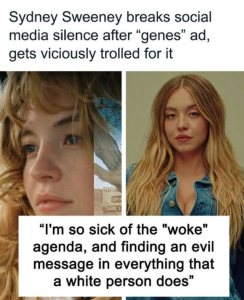People Call for Boycott of Sydney Sweeney’s New Film as Star Breaks Silence Following Ad Scandal
When Sydney Sweeney agreed to front American Eagle’s latest campaign, she likely expected it to be a fun, fashion-forward job — something light, playful, and in line with her image as one of Hollywood’s most bankable young stars. Instead, it became one of the most controversial ad campaigns of the year, sparking outrage, political debates, calls for boycotts, and even a ripple effect that carried over to her new movie.
The ad itself seemed simple enough. Sweeney, dressed in a casual but stylish denim look, leaned into the brand’s messaging: “Genes are passed down from parents to offspring… My jeans are blue.” The campaign, which officially launched on July 23, 2025, played on the pun between “genes” and “jeans.” The wordplay was supposed to be cheeky, but it quickly backfired.
Critics slammed the message as tone-deaf, accusing American Eagle of using imagery and phrasing that evoked eugenics, whiteness, and even Nazi propaganda. Because Sweeney is blonde and blue-eyed, some viewers said the ad inadvertently positioned her as the poster child for a racially loaded campaign. What might have been dismissed as an over-analysis in another era snowballed in today’s climate of hyper-scrutiny.
The backlash was swift. Commentators on X, Instagram, and TikTok tore apart the ad’s wording and imagery. A university lecturer went viral for labeling it “steeped in eugenic undertones.” Others echoed the sentiment, warning that the message celebrated inherited “good genes” in a way that ignored diversity. What had started as a denim promotion had now escalated into a cultural firestorm.
But not everyone saw it that way. A poll conducted in early August revealed that only 12% of Americans actually found the ad offensive. In fact, 39% thought it was clever, and 40% said they had no strong opinion either way. The divide, however, was political: Republicans were more likely to approve, with 57% calling it “clever,” while Democrats were far more critical. Men were also more forgiving than women. This split only intensified the debate, transforming Sweeney’s campaign into a flashpoint in the culture wars.
As the criticism grew louder, American Eagle initially stood by the campaign, pointing to its positive reception among much of its target market. But for Sweeney, the timing could not have been worse. Just as the storm was brewing, she was preparing to promote her new film Americana, a modern Western with themes of music, ambition, and history.
The problem? Every time her name trended, it wasn’t about her film. It was about the ad.
Sweeney went quiet on social media for weeks, fueling speculation about how she would respond. Then, days before Americana’s premiere, she broke her silence. On Instagram, she returned with promotional stills from the film and a message highlighting her character Penny Jo Poplin, a waitress chasing country-singing dreams. While she avoided directly addressing the ad scandal, the timing of her post made it clear she was trying to shift attention back to her craft.
It didn’t work.
Americana debuted on August 15, 2025, in over 1,100 theaters. Industry insiders had modest expectations for the release, but the numbers still shocked them: the film opened to just $840,000 at the U.S. box office, averaging a meager $460 per theater. Analysts quickly tied the weak performance to the controversy surrounding Sweeney. Instead of talking about the film, audiences were embroiled in debates about jeans, genes, and political identity.
Boycott calls only added fuel to the fire. Across comment sections and forums, users declared they would refuse to watch Americana as a form of protest. Some insisted they would never support a film tied to someone who participated in the ad, regardless of intent. Others claimed Sweeney’s political leanings — she was revealed to be a registered Republican in Florida — made her an inappropriate face for a campaign that already felt politically charged.
The controversy gained even more visibility when Donald Trump praised the American Eagle ad, calling it “fantastic.” That endorsement cemented the campaign as a political football, with one side defending it as harmless fun and the other condemning it as a dangerous dog whistle. For Sweeney, the result was the same: her movie became collateral damage.
Not everyone believed the boycott narrative, though. On Reddit, some pointed out that Americana had been shelved for years and was receiving lukewarm reviews regardless of the ad scandal. “It was doomed to flop anyway,” one commenter wrote, arguing that the boycott chatter simply provided a convenient scapegoat for a weak film.
Still, perception matters, and the perception now was that Sweeney’s brand was tainted. Instead of headlines about her rising star power, the conversation shifted to whether she had crossed into “problematic” territory. Her attempt to pivot from TV darling in Euphoria to serious leading lady on the big screen seemed to falter under the weight of a denim campaign gone wrong.
Branding experts note that in today’s climate, controversy can sometimes work in a celebrity’s favor — even negative attention keeps them in the spotlight. But the risk is when the scandal overshadows the work itself. In Sweeney’s case, the buzz around the ad was louder than anything said about Americana. That imbalance can derail careers if it lingers too long.
For now, Sweeney is caught between conflicting narratives. To some, she is a victim of online overreaction, unfairly targeted for a harmless ad. To others, she represents the dangers of careless marketing and tone-deaf celebrity endorsements. And in the middle, she remains an actress trying to prove her staying power in a notoriously unforgiving industry.
The larger lesson of the controversy may not even rest on Sweeney’s shoulders. It is a reminder of how quickly advertising, celebrity culture, and politics intersect in today’s media environment. A single line in an ad can ignite nationwide debates, not because of what it says on the surface, but because of the meanings people project onto it.
Whether Americana finds a second life on streaming platforms or fades into obscurity, the incident will follow Sweeney for some time. Every interview, every press appearance, every brand deal may circle back to that one campaign. The irony, of course, is that the ad was supposed to celebrate something as uncontroversial as denim. Instead, it became a symbol of the era’s polarization.
For Sydney Sweeney, the path forward will require careful choices. She may embrace the controversy and double down, or she may quietly rebuild her brand through roles that remind audiences why they admired her in the first place. Either way, the episode is a cautionary tale for stars and brands alike: in the age of viral outrage, even a pun can derail a career.



